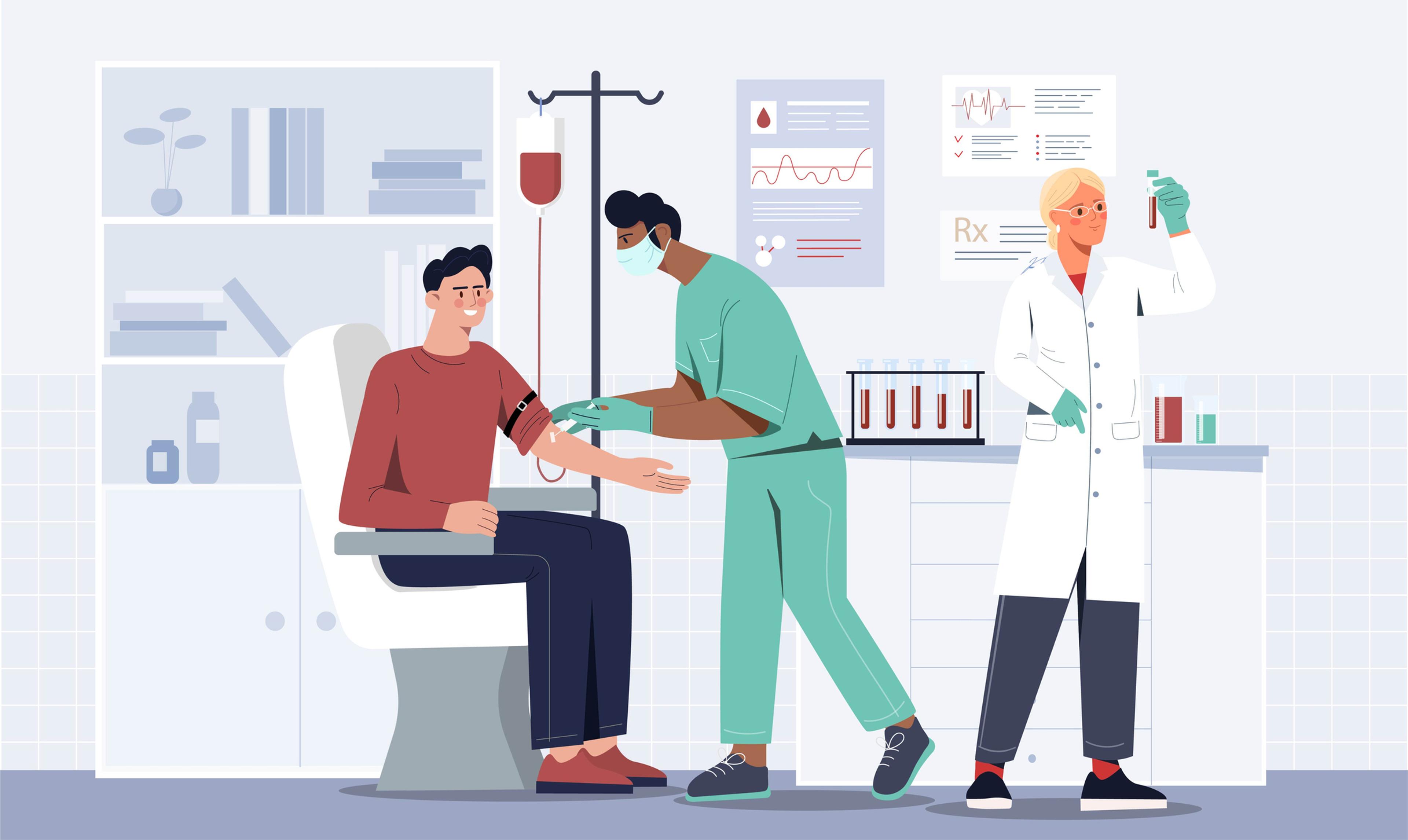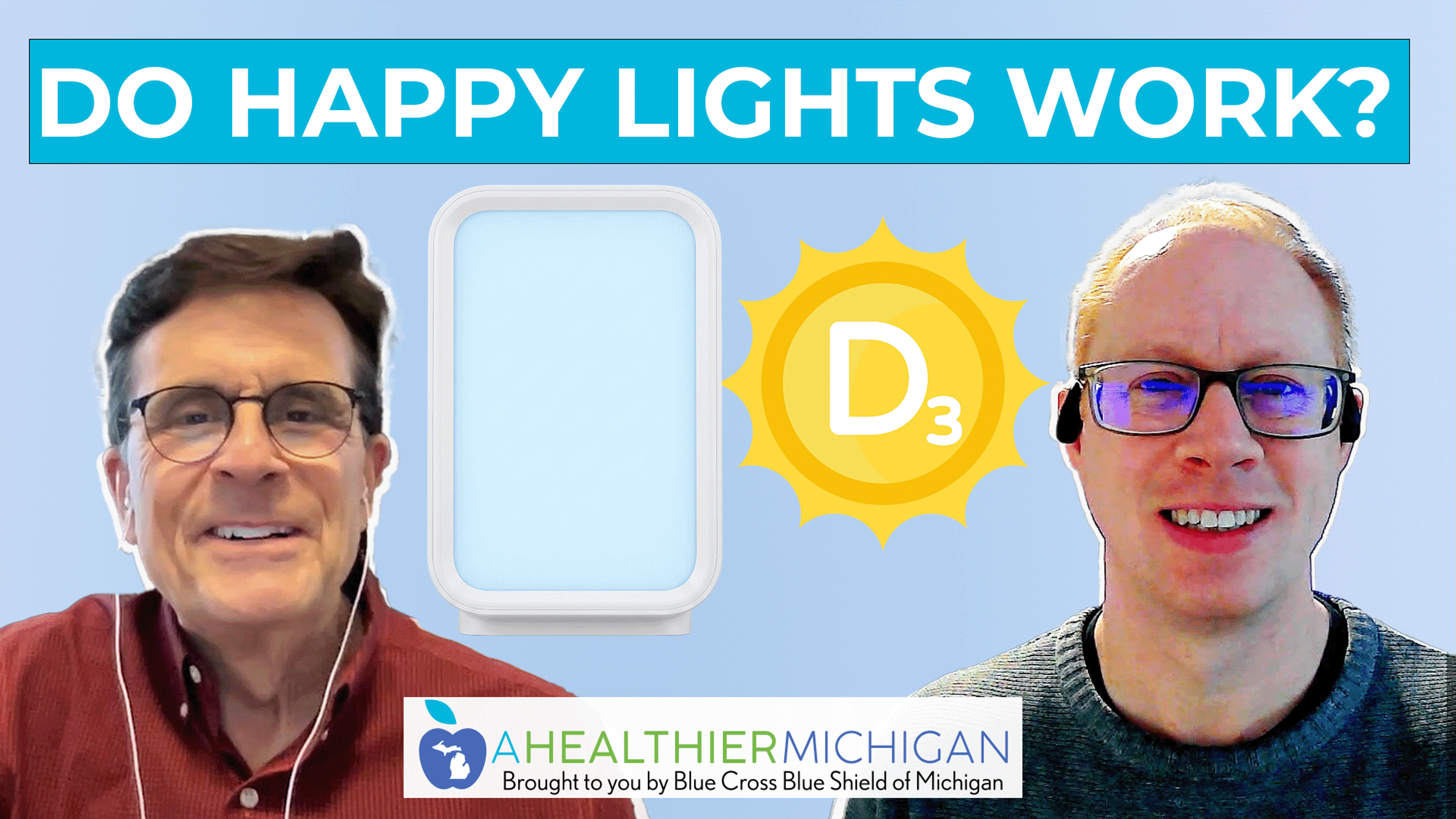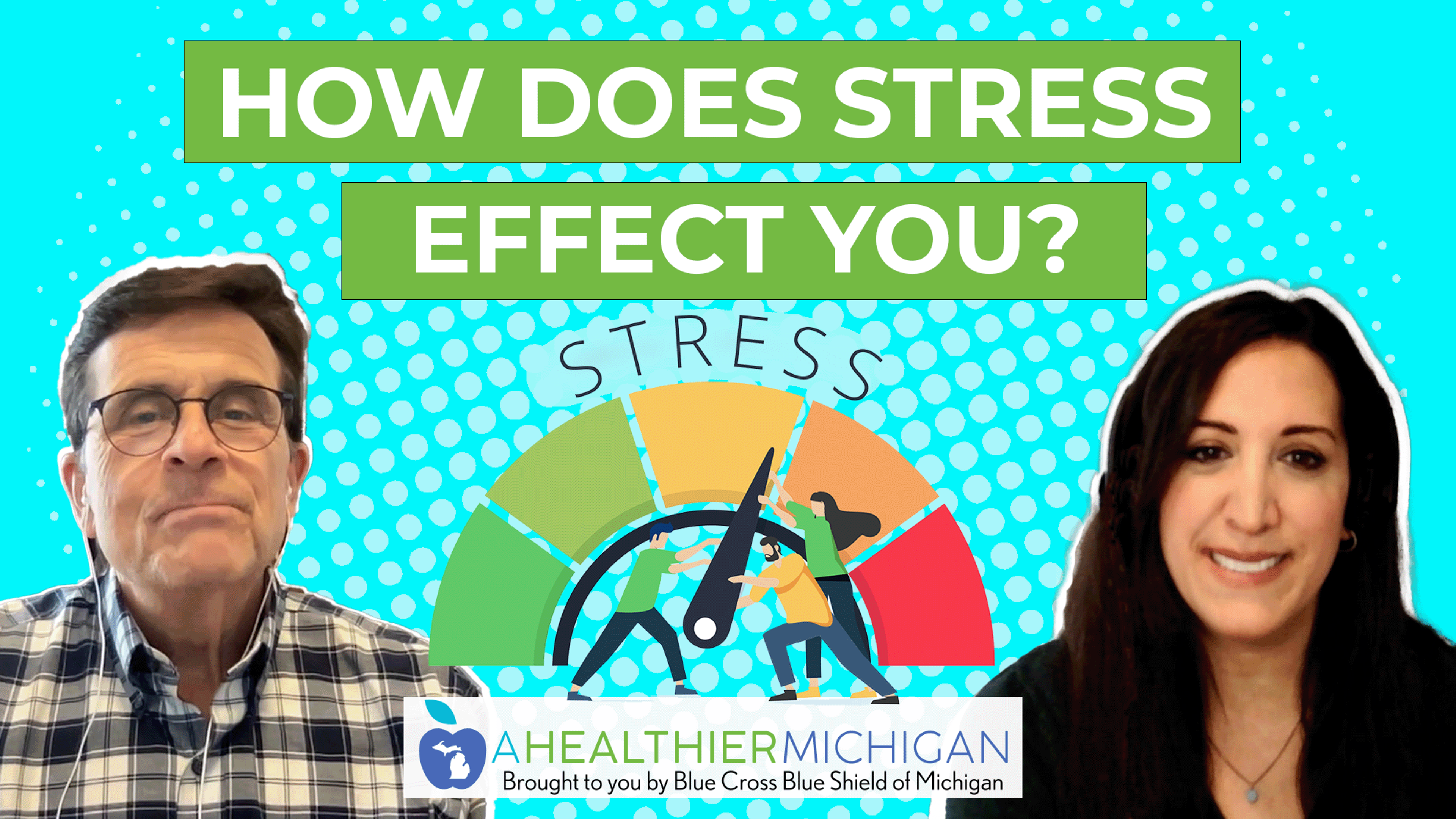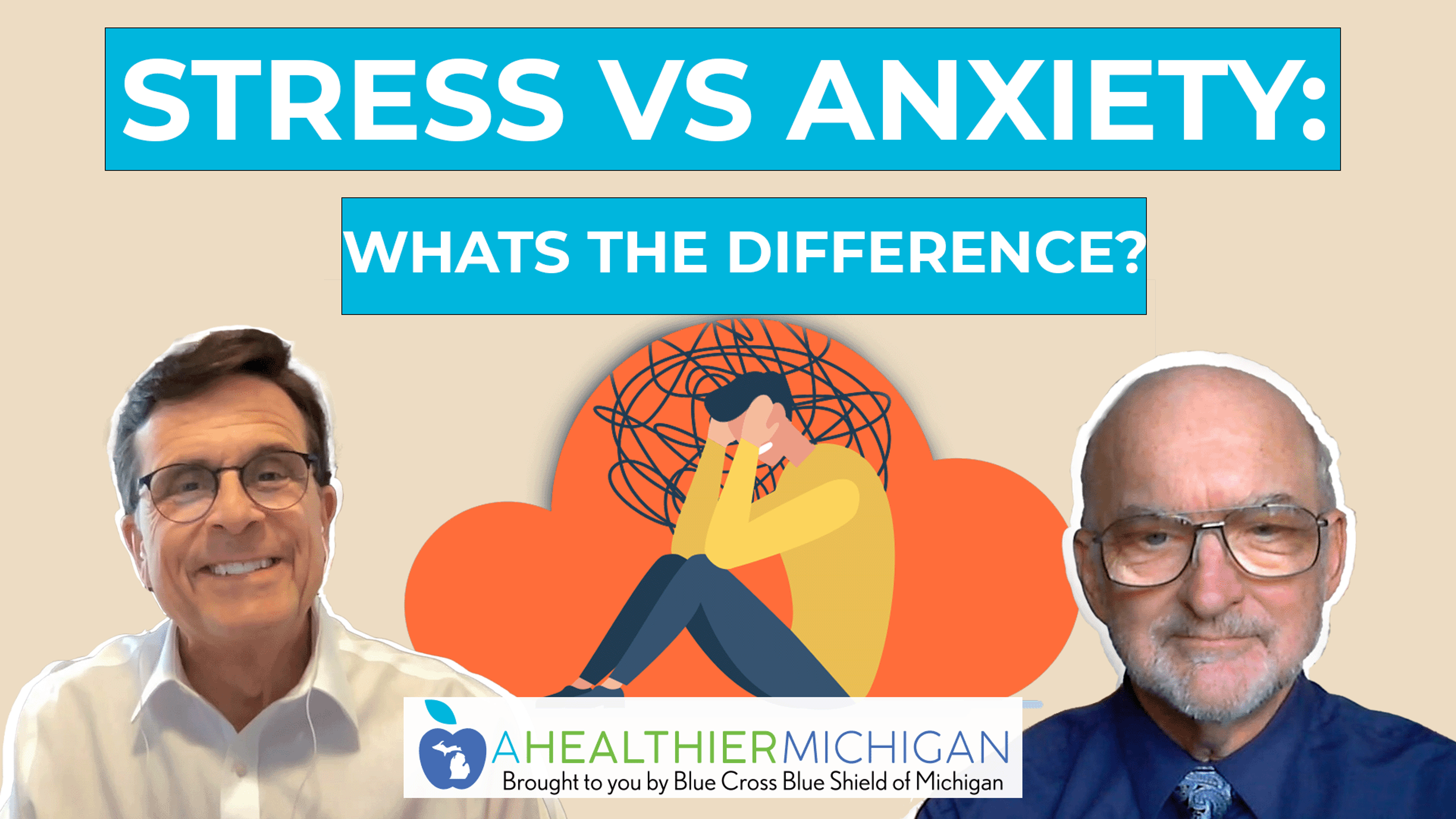Do Food Sensitivity Tests Actually Work?
| 1 min read

00:00
00:00
About the Show
On this episode, Chuck Gaidica is joined by Shanthi Appelö, registered dietitian for Blue Cross Blue Shield of Michigan. Together, they explore if it's possible to take a test that shows you which foods to avoid.
In this episode of A Healthier Michigan Podcast, we explore:
- The differences between food sensitivity, food intolerance and food allergy
- The reliability of food sensitivity tests
- Recommendations one should take if they're experiencing digestive symptoms
Transcript
Here is the full transcript of this episode. You can listen to the audio version on streaming platforms or watch on YouTube.
Chuck Gaidica:
So is it possible to take a test that shows you which foods to avoid? This is A Healthier Michigan Podcast, episode 144. Coming up, we discuss food sensitivity tests and how to understand them and how reliable are they? Great question.
So is it possible to take a test that shows you which foods to avoid? This is A Healthier Michigan Podcast, episode 144. Coming up, we discuss food sensitivity tests and how to understand them and how reliable are they? Great question.
Welcome to A Healthier Michigan Podcast, the podcast dedicated to navigating how we improve our health and wellbeing through small, healthy habits we can start right now. I'm your host, Chuck Gaidica. Every other week, we'll sit down with a certified expert and we discuss topics that cover nutrition, fitness, and a lot more. And on this episode, we're taking a look at the reliability, or maybe even the lack thereof, of food sensitivity tests, as well as understanding if they're worth using.
With us today, Shanthi Appelö, who's back to help us understand this. She's a registered dietitian, and I know you've taken a look at this topic, right? It's not just an anecdotal thing because people are talking about this. There is a buzz out there.
Shanthi Appelö:
Yeah. I think naturally if people have any kind of digestive issues, maybe they're not feeling their best self, they want to figure out what is the issue. And things that we can control in our lives are of course what we put into our body. And so I think it's natural for people to see a test, like a food sensitivity test and think, "Huh, maybe this can be a solution to some of my problems. Maybe I can figure out what's wrong with me." So I definitely see why they're popular.
Chuck Gaidica:
Well, and there's more promised with a lot of these tests, right? It's not just telling you that you're sensitive to a food. And they seem to be getting popular. A lot of these tests are saying that they'll provide answers to then physical things, manifestations like heartburn or abdominal pain or bloating. So I understand the connection with eating something that your body may not like, but they're making some kind of promise that goes beyond just telling you, "Hey, avoid a certain food," right?
Shanthi Appelö:
Yeah. I think that can definitely be the case. And there are so many different companies out there that are promoting different products, but when it comes down to it, a food sensitivity isn't actually a medical term. So I think that's maybe a good place to start. It's just like, "What is a food sensitivity? What is the food allergy intolerance?" There's so many different terms. So I think maybe that's where we can start. So a food allergy is like the medical condition. Someone would consume a food. And then as a response, our immune system would then be triggered and it would be like, "Oh my gosh, there's this harmful substance in my body. I'm going to start making antibodies" so the antibodies could fight it off, right? As a result, people get symptoms like skin rashes. They can have trouble breathing. And in some cases with allergies, it could result in anaphylaxis. So they can be really serious.
Now, an intolerance is going to be when someone has difficulty digesting a certain food. I think a really common one is going to be IBS, so irritable bowel syndrome. Another one is going to be if someone has, for example, lactose intolerance. So what happens in lactose intolerance is that they're missing an enzyme required to break down certain foods. So someone drinks a glass of milk. Typically, this enzyme called lactase would be trying to break down the lactose that's naturally occurring in that milk. But if there's not enough lactase made or someone isn't making it, then that lactose is going to be stuck in the stomach, in the digestive tract somewhere. That can cause bloating, that can cause inflammation, it can cause diarrhea. And so not so pleasant aftermath, right? Now, that's an intolerance.
Now, a sensitivity is not an allergy, it's not celiac disease, it's not an intolerance, but it's something that is not going to make you feel great. There could be symptoms. Some people can feel fatigued, maybe they get a rash. For example, gluten sensitivity is going to fall into this. They feel tired, they feel sluggish after consuming gluten, but they're not allergic to it. They don't have celiac disease, which is a autoimmune disease. So anyways, there's no standard definition in the medical world for a sensitivity. There's nothing life-threatening about it, but it can just be uncomfortable.
Chuck Gaidica:
Yeah. And even though there's no definition in whatever big thick book we can look to that's got medical written on it, but somebody could still have symptoms that pop up like you're saying with certain foods, even gluten. Yeah.
Shanthi Appelö:
Yeah. So now I think what we need to start talking about then is the testing for the different things and how this food sensitivity tests came to be, right? So when we look at allergies, there are a lot of different ways to test for allergies. Allergy specialists do different things for different patients, and oftentimes it includes some kind of blood test or a skin brick. So what they're doing is they're measuring for a protein called immunoglobulin.
Chuck Gaidica:
Yeah, that sounds like a scary Halloween word, but yeah, go ahead. I know what you mean.
Shanthi Appelö:
For short, Ig. And on the end of that, IgE. So the presence of IgE antibodies are going to indicate an immune response. So that's how allergies can be diagnosed. Now, what food sensitivity tests look at are actually not IgE. They look at an immunoglobulin still. They still look at IgE, but they look at something called IgG. And the problem with IgG is that they have not been shown to really reliably identify any allergies or sensitivities. So whenever I just, say, had a salad, my bowl of sitting right here, after I ate that, my body's probably going to be producing some IgG antibodies, but that doesn't mean I'm sensitive to it.
Chuck Gaidica:
Yeah. Well, it's ironic that what you're saying is that the sensitivity, which may not be a real thing, they added another globulin word to it to make it sound even more dire. That's really interesting.
Shanthi Appelö:
Well, no, it is a real thing. It is real immunoglobulin in the body.
Chuck Gaidica:
Right.
Shanthi Appelö:
But yes, that is what they're looking at, is that IgG, not IgE. And that's the big distinguishing factor between a food allergy test and a food sensitivity test.
Chuck Gaidica:
So I want to get cynical with you for a minute because one of the first things that I started to notice when they started remodeling our local drugstore, which appear on every corner kind of, that they're making them into these healthful looking places with a clinic and you get your shots and your vaccines. And then there are these aisles with everything from CPAP supplies, and all of a sudden I look over and here are all these tests that are starting to appear. And the cynical nature, maybe it's the reporter in me goes, "Ah, they're just trying to sell tests." Maybe everything is going over the counter and it's okay, but I think what's happening is we're seeing this more online. We're getting hit with it in the stores and you're telling me that some of this stuff may not really work.
Shanthi Appelö:
Yeah. So of course there's a lot of health marketing for a lot of products that I don't necessarily believe in, right? But I think what we need to look at here is just the evidence. Also, when we look at professional organizations that specialize in allergies and things like that, none of them are recommending these food sensitivity tests. So there's really no evidence that making changes in your diet based on these food sensitivity test results makes a positive change in your life. So I think that's what we need to look at here.
Now, if you take a food sensitivity test and it gives you a certain result, it can make you cut out things that you may not even need to cut out. I remember during my internship, I worked in a setting where some of these tests were given out and someone showed a sensitivity to lettuce and she was like, "Oh my God, I eat lettuce every day. This makes so much sense. This has to be it, right?" What can often happen is that an antibody, this immunoglobulin, IgG, appears because someone has had a recent exposure to that food or has had it in the past. So it's more of a memory of the immune system. So things could show up on the test even if you're not sensitive, like something like lettuce, which doesn't have... I mean, people can certainly be sensitive to different types of lettuces, but it's not very common.
Chuck Gaidica:
That's interesting. It reminds me and not as critical away of taking a COVID test, and then you take another one and people tell you, including doctors, there's still a remnant. So you're kind of saying there's still a lingering effect that it may be showing up as lettuce, but it just hasn't disappeared yet. That's interesting.
Shanthi Appelö:
Yeah. Our body is recognizing that we have consumed something and is producing an antibody in response.
Chuck Gaidica:
So can these tests affect somebody's diet or health?
Shanthi Appelö:
Yeah. If someone takes this test and they get a range of results, I think it can cause a lot of different things. One is that they could start making changes to their diet when they don't actually need to be making changes to their diet. They think they're sensitive to something. Maybe it's a really healthy food, and now they're cutting that out and missing healthy foods in their life, right? I think also something that can happen is if someone really has a true allergy, these food sensitivity tests are not going to be able to test for that and they could be consuming foods that are actually harmful to them. So going to a real allergist, involving your doctor, talking to a dietitian is a much better way to go about it. And then I think a very real thing with a lot of these tests that exist is that they can cause a lot of health anxiety. Maybe we're now fearful of eating certain foods, even though they wouldn't be causing us any issues.
Chuck Gaidica:
Well, and you started to go down this path, the idea that what if your test comes back and it shows you've got three or four different items, different vegetables or something you shouldn't eat, and you throw them all out the window, right?
Shanthi Appelö:
And it would be unnecessary.
Chuck Gaidica:
Well, yeah. And it may not even be real for any of the three or four. It may be one of them, but to your point, it seems to me that maybe there is what's old is new again. What is the solid way of testing if you think you are having digestive symptoms and you've got food sensitivity> what should we be doing?
Shanthi Appelö:
So the first thing you want to do is of course, talk to your doctor. If there's a potential that there could be a true allergy there, that's something to explore first, right? But something that does work is an elimination diet, and this is definitely something that you want to do in coordination with a health professional. Like your primary care physician, they'd likely put you in contact with a registered dietitian who specializes in this kind of thing. And start cutting out things that could potentially be making you sick.
A big part of that too is keeping a diary for yourself where you are consuming food. Very similar to people with diabetes. I used to encourage this a lot when I worked a lot in diabetes, is that people would write down what they ate and then they would write down their blood sugar afterwards and figure out kind of like, "Why did my blood sugar do this?" And it would help them recognize patterns. The same thing goes for food sensitivities. If you're recognizing that you're feeling sluggish after certain things, list all the things that are there and figure out if maybe there's a common denominator and then work to eliminate that from there.
Chuck Gaidica:
I think that's a lot of wisdom. And I think oftentimes we forget that some of the things we're eating actually have a product that could be causing it, but it's not labeled as such. For instance, I have a friend that found out that they were lactose intolerant, but they loved pizza. They didn't really intellectually make the connection, the cheese. But I mean, we all kind of know it, but when you like pizza and it's lathered up, they're like, "Oh" Ding. The light bulb went off and they're like, "Okay, now I get it." Right? So sometimes it takes a minute to narrow that down by process of elimination.
Shanthi Appelö:
Yeah. Yeah. And just it allows you to become more aware of what ingredients are really in certain foods. And in some ways, it can allow you to eat very healthy because you're getting down to the basics of whole ingredients and trying to figure it out from there.
Chuck Gaidica:
Yeah. So as we start to wrap things up then, takeaways for us on this whole idea of these tests, these sensitivity tests, because they are getting some traction.
Shanthi Appelö:
Yeah. So I think if you ever have questions about any of these, regardless of what kind of home test it is, make sure that you're involving your physician, your primary care provider, asking them questions. Think what has happened in recent years and why a lot of these tests gained popularity through social media. So there are a lot of influencers that promote them. They may go online and say, "Hey, I took this test. I cut all these things out, and now I feel amazing." Those are stories that make us really motivated to want to try them, right? So just think twice about that, see where those commissions are coming from, if it's an ad. And again, just involve your healthcare provider because they are going to know best.
Chuck Gaidica:
Well, that's great. Well, it's good to have you with us. And I've heard of these, but never thought that they didn't have that much value, but you really brought it home for us. Thanks, Shanthi.
Shanthi Appelö:
Thanks.
Chuck Gaidica:
Shanthi Appelö with us, a registered dietitian for Blue Cross Blue Shield of Michigan. And if you like listening to A Healthier Michigan Podcast, just so you know, it's brought to you by Blue Cross Blue Shield of Michigan. And if you want to know more about the show, check us out. There's a refreshed new looking website. It's ahealthiermichigan.org/podcast. A lot of awesome content there for you. You can leave us reviews or ratings on Apple Podcasts or Spotify. You can catch episodes now on our YouTube channel. So you can check us out there. And also follow us on Facebook, Instagram, or Twitter. You can get the new episodes, all the old episodes on your smartphone or tablets so you can make them part of your healthy journey even while you're working out. Be sure to subscribe. Hit that button. Subscribe to us on Apple Podcasts, Spotify, or your favorite podcast app. I'm Chuck Gaidica. Be well.





